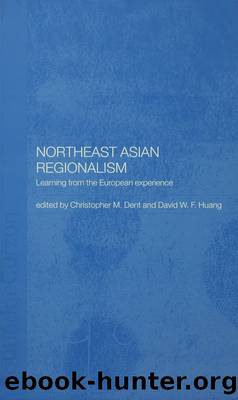Northeast Asian Regionalism by Dent Christopher M.;Huang David W. F.;

Author:Dent, Christopher M.;Huang, David W. F.;
Language: eng
Format: epub
Publisher: Taylor & Francis Group
Appendix A: A List of Regional Cooperation Schemes According to Ten Categories of the ECA
Chapter 6
Northeast Asian States after the Cold War
Rival States or Co-Operative States?
Chao-Jen Huang
1. Northeast Asian Regionalism after the Cold War: Rival States or Co-Operative States?
Having assumed that Northeast Asian regionalism1 arises from economic interdependence and interconnection, one must acknowledge one hypothesis which suggests that such economic interdependence is immediately confronted with the likelihood stressed by realist theories of international relations, that nation-states are destined to conflict in pursuing their interests in the global system. In this chapter it will be argued that the development of Northeast Asian regionalism was achieved through the collective decisions of nation-states. In doing so, it is appropriate to ask whether Northeast Asian regionalism has acquired sufficient dynamism to sustain its current economic momentum and to attain an atmosphere of Northeast Asian cooperation. Will co-operation among the Northeast Asian political actors endure now that the major external incentive to stick together â the threat of the Cold War â has gone? In short, what will be the future of Northeast Asian regionalism in the global system?
In this chapter, an effort is made to answer these questions by examining the issue from three major theoretical perspectives: neo-realism, neo-liberal institutionalism and structuralism. It will be argued that neo-realist analysis has proved valuable in explaining and understanding Northeast Asian regionalism over the last few decades. Neo-realist analysis may argue that Northeast Asian regionalism will be a means to the fulfilment of the goals of self-interest and national security. This chapter further maintains that uncertainties and challenges from either external or internal environments in both their economic and political aspects would have to result in instability and insecurity, a development which neo-realist theory seems to predict. In contrast, neo-liberal institutionalism argues that successfully political and economic co-operation will be necessarily dependent on the functions of institutional arrangements to form international regimes, agreements or regulations to regulate or co-ordinate the policies of nationstates. However, structuralism may suggest that globalisation has pressed states to form a larger effective union regionalism, both for economic efficiency and political power bargaining over the rules and institutions that may govern global economy.
2. Neo-Realism and Northeast Asian Regionalism
During the Cold War period, much of the research concerning the interactions among Asia-Pacific political actors had focused in part on the merits of hegemony theory. The arguments are familiar: a hegemonic power in the region is a necessary condition for the establishment and maintenance of the stability and prosperity of Asia-Pacific. According to the essence of hegemony theory, the hegemony provides the public good of stability for the sake of its own national interest. Accepting this argument, if we investigate the interactions of the Asia-Pacific countries, we find that the United States plays a hegemonic role in the economic, political and military fields and provided a security umbrella for Northeast Asian countries to counteract communist threats.
Realism therefore suggests that now the Cold War has ended, Northeast Asian countries may come to experience an anarchical society, which is essentially a Hobbesian state of nature as a state of war.
Download
This site does not store any files on its server. We only index and link to content provided by other sites. Please contact the content providers to delete copyright contents if any and email us, we'll remove relevant links or contents immediately.
Collaborating with Parents for Early School Success : The Achieving-Behaving-Caring Program by Stephanie H. McConaughy; Pam Kay; Julie A. Welkowitz; Kim Hewitt; Martha D. Fitzgerald(899)
Entrepreneurship Education and Training: The Issue of Effectiveness by Colette Henry Frances Hill Claire Leitch(666)
Adding Value to Policy Analysis and Advice by Claudia Scott; Karen Baehler(499)
Materializing the Middle Passage by Jane Webster;(497)
Race and American Political Development by unknow(489)
Sociological Perspectives of Health and Illness by Constantinos N. Phellas(478)
American Government and Politics Today by Steffen W. Schmidt Mack C. Shelley Barbara A. Bardes(477)
Human and Global Security : An Exploration of Terms by Peter Stoett(473)
Control Of Oil - Hardback by Kayal(467)
Advances in Child Development and Behavior, Volume 37 by Patricia J. Bauer(403)
The Disappearance of Rituals: A Topology of the Present by Byung-Chul Han(401)
The Catholic Church and European State Formation, AD 1000-1500 by Jørgen Møller(392)
The World According to China by Elizabeth C. Economy(383)
Left Is Not Woke by Susan Neiman(371)
Theories of Counseling and Psychotherapy: A Case Approach by Nancy L. Murdock(371)
Application of classical statistics, logratio transformation and multifractal approaches to delineate geochemical anomalies in the Zarshuran gold district, NW Iran by unknow(364)
Cross-Cultural Child Development for Social Workers by Lena Robinson(358)
Turkey's Relations with the West and the Turkic Republics: The Rise and Fall of the Turkish Model by Idris Bal(353)
Japan's Ainu Minority in Tokyo by Mark K. Watson(340)
